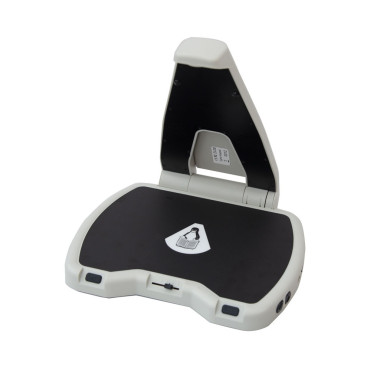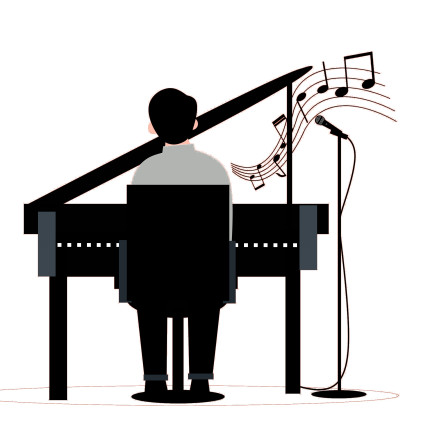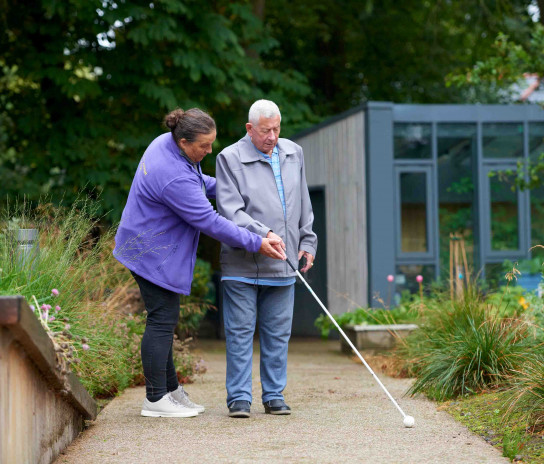A jazz band pianist for decades, Fred Smith has always had an ear for the right note at the right moment.
Now that his sight is deteriorating, Fred is taking note of a new piece of equipment called the Hark Reader, supplied to him by our Sight Scotland Veterans team.
The Hark Reader is a machine that reads aloud whatever text is placed in front of its camera. The text-to-speech machine speaks with an English accent and is smart enough to read out sentences with a natural rhythm, emphasising sentences in just the right places.
Fred, who has macular degeneration, has been using the Hark Reader to read science fiction.
Fred said: “I can put a book under the camera, then sit back in my chair and relax. I’d recommend it to anybody having trouble reading.
“I’ve just read Michael Crichton’s book “Airframe” with the Hark Reader, and now I’m on to reading his novel called 'Prey'. It reads from the top left of the page and has certainly been a help.”
Caption: The Hark Reader, which reads out text that is placed in front of its camera.


“I can put a book under the camera, then sit back in my chair and relax.
"I’d recommend [the Hark Reader] to anybody having trouble reading."
Fred is an RAF veteran, having been called up in December 1945 at the age of 18. He trained in navigation, but with the war in Europe recently finished, he didn’t see much action.
Fred said: “The most exciting thing I did was being put in charge of a bunch of ten German prisoners at a prisoner of war camp. It was near the RAF base in Northern Ireland.
“We got them to do manual work, as some were tradespeople. The prisoners were mostly happy to do the jobs they were assigned to around the camp. They didn’t want to go back to a ruined Germany, in the late 1940s.”
Following two and half years of service, Fred started working as a professional musician, playing piano at a dance hall near the RAF base. He moved to London and married. Fred spent the daytime working in the road haulage industry, then in Scotland as a salesman, and then for the Strathclyde local authority.
His nights, though: they were spent on the keys.
Throughout the 1950s, 1960, 1970s and 1980s, Fred played in traditional-style jazz at gigs across England and Scotland. For several years, he joined talented trumpeter Alex Dalgleish and his band “Alex Dalgleish’s All Stars”.
Fred said: “Alex named his band ‘the All Stars’, after ‘Louis Armstrong and the All Stars’. We played two gigs a week pretty regularly around Glasgow in the 1960s, 1970s and 1980s. But we also played in Ayrshire and went as far as Inverness, playing in Aberdeen, Dundee, Dunoon, Paisley, Kilmarnock, and Irvine.”
Alex Dalgleish’s All Stars gained a regular Sunday gig at the renowned Gleneagles Hotel near Perth for several years too.
Fred said: “I enjoyed many happy experiences with the band. Jazz is a creative process; it’s not just playing a tune.
"You’re adding and embellishing and building around it. You can play the original melody with slight variations here and there, or can even abandon the original melody.
“When I’d arranged a piece of music and I’d hear the band play it, it’d be a great feeling. When it came together, it felt good. I much preferred playing with company to playing solo.”
Sight Scotland Veterans provides free advice and support to veterans impacted by sight loss, as well their family, friends and loved ones. Joining Sight Scotland Veterans is free, and membership is open to anyone living in Scotland who has served in the Armed Forces – including National Service – and is experiencing changes to their sight.
You can refer a veteran here, or call us on 0800 035 6409 for more information.

You may also be interested in
Veterans with low vision using virtual reality headsets to enjoy mountain views
Veterans with visual impairment are able to experience some of Scotland's iconic mountains thanks to virtual reality headsets.
